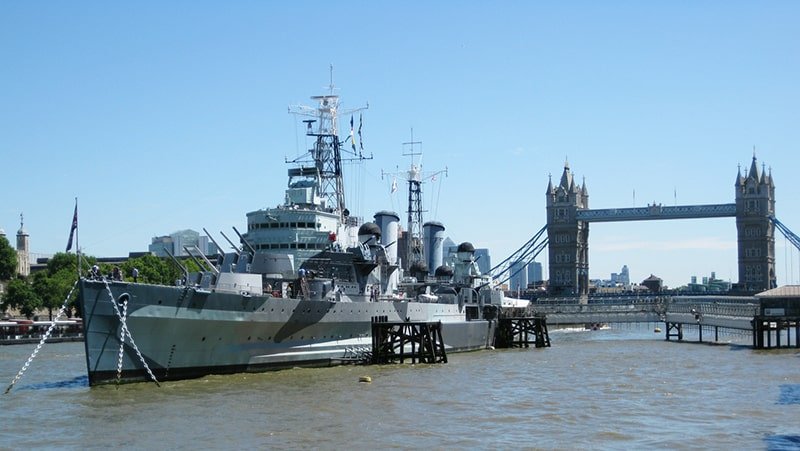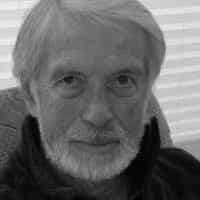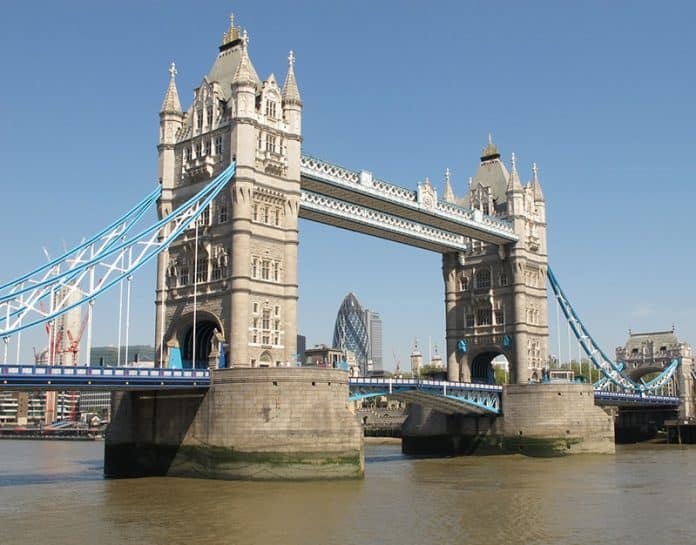The RAF is celebrating being 100 with months of special events, but how exciting they’ll be remains to be seen. I doubt if they can match the sheer bravura of one pilot who decided to liven up a feeble 50th anniversary by rudely violating Tower Bridge and posting his Hawker Hunter between its teasing spans – a personal statement that dazzled the nation.
Just for fun, here’s the story again from an earlier piece…..
In 1968, on April Fools’ Day, the RAF’s 50th was a miserable affair. Nothing befitting such a momentous occasion was planned, much to the disgust of many serving officers and public. These were unhappy times. The RAF was already losing its fighting edge, its capabilities diminished by spending reviews. The UK’s aircraft industry was in decline and so was British morale. Resentment against the Government was growing, and the top brass didn’t seem to care.
![]() No formal fly-past had been organized over the Capital, a shocking show of indifference for the valiant service the RAF had provided the nation for half a century. But one pilot decided to lay on a dramatic flying display of his own, and at the same time deliver a jolt to Parliament, in the absence of any other aerial entertainment for Londoners.
No formal fly-past had been organized over the Capital, a shocking show of indifference for the valiant service the RAF had provided the nation for half a century. But one pilot decided to lay on a dramatic flying display of his own, and at the same time deliver a jolt to Parliament, in the absence of any other aerial entertainment for Londoners.
At West Raynham (Norfolk) resided No.1 (Fighter) Squadron, the RAF’s and the world’s oldest military air squadron. Its senior operational flight commander, Flt Lt Alan Pollock, was mulling over how the mark the anniversary. RAF Tangmere, a star fighter station in the Battle of Britain, had arranged an excellent local show for April 4 and invited No.1 (F) Squadron to make a return visit to their pre-war home for a party after first flying over the nearby “Freedom of the City” march-past through Chichester. Pollock and three of his fellow Hawker Hunter fliers obliged. A good time was had by all and next day they set off back home.
But Pollock had hastily sketched out a fun diversion of his own after “a quick peep” at an inadequate AA book of Central London. He gives this extraordinary account of what happened next… (full text can be read here at RAFever.org)
London lay astride my straight-line return route to West Raynham. All I needed was to lose contact with the other Hunters immediately I was airborne, somehow slipping off to the north unobserved and without arousing suspicion.
My route over London would obviously have to be low level. To reduce the Rolls-Royce Avon’s noise and inconvenience to Londoners, I would cut my speed down and drop my flaps once I was over the built up areas. At idling thrust, the Hunter was a very quiet bird of prey. The lower I was, the less likely I would encounter any other air traffic – not too many aircraft transit throttled back at 80 feet!
I crossed Vauxhall Bridge and there, a mile or so ahead, was that familiar and splendid silhouette of the Houses of Parliament, viewed within a special sense of Triplex privacy. This was my main target area.
As I banked over climbing slightly to circle Whitehall and the historic seat of British government, I had to open my throttle fully to maintain a good tight orbit. I realised this would put the noise level up considerably, which up to now I had been careful to keep as low as possible to avoid offence or complaint. As I put the Rolls-Royce power on, I decided that this was perhaps what was really necessary at this juncture to wake up our MPs and remind other august figures, sitting chairbound at their ministerial desks below, that we still had a fighting Air Force, one small unit of which was celebrating its anniversary, despite the dead hand of government policy and the sickening cut-backs of previous years.
The message to Westminster was received. A debate was interrupted. Later a four MP cross-party inter-service motion of support for the tribute was ruled retrospectively out of order. Quashed, it was reportedly deleted from Hansard!
Three times I circled, exactly as Big Ben struck 12 noon. With care I kept well clear of Buckingham Palace, which was plainly visible outside my orbit. Surprisingly there was time idly to wonder in the final turn exactly how many regulations I was breaking at this rather exclusive and delicious moment.
After my final orbit I levelled out again over the Thames, dipping my wings past the RAF memorial and coincidentally the statue of Viscount Trenchard, who had helped to found the RAF in 1918 exactly 50 years earlier, despite tremendous opposition.
I decided that, rather than cross the heavily populated area to the north or climb through the airspace used by inbound airliners, the safest plan for all concerned was for me to follow the Thames eastward at low level out into a less populated area and then turn north for home.
At one minute past noon, I turned happily down river. Over Waterloo Bridge I could see the architecturally pleasing Post Office Tower away over to the left, then suddenly ahead a fine view of St. Paul’s Cathedral, at this time with its lattice work curtain of scaffolding.
Despite thousands of sorties in Europe, Africa, Asia and the Middle East, I felt now like some voyeur or landscape artist, so intoxicated with the various views to the left and right of me that it was literally just before my wings crossed London Bridge when I looked ahead and suddenly saw Tower Bridge.
There, standing like some proud, strong sentinel across the Thames, this famous matronly structure blocked my low level path to the east.
Until this very instant I’d had absolutely no idea that, of course, Tower Bridge would be there. It was easy enough to fly over it, but the idea of flying through the spans suddenly struck me. I had just ten seconds to grapple with the seductive proposition which few ground attack pilots of any nationality could have resisted. My brain started racing to reach a decision. Years of fast low level strike flying made the decision simple.
From a trained low level pilot’s point of view it provided an interesting penetration problem. To give added decision time I jinked hastily to line myself up directionally and pre-position down low over the river, with my eager fighter well beneath the tall cranes standing like silent, puzzled spectators on the banks. This manoeuvre would give me a full extra three seconds of decision time to study defloration further.
There was considerable road traffic I could now see, including a red double decker bus, slowly lumbering across the famous, double-basculed bridge from north to south. With less than half a mile or so to run, I realised that it would be easy enough to fly through, but what would be the best and safest way?
Swiftly I concluded Sydney Camm’s favourite fighter would have to fly as close to the top structure as possible. At the last split second before I crossed underneath, the steel girders suddenly seemed to explode all about my cockpit, above, below and about my ears, totally engulfing canopy and one’s traditional sense of flying fun! That microsecond my mind felt quite certain I had overcooked it and the top span would certainly take my fin off the next millisecond.
On his way home he beat up Wattisham, did a Mach .93 divebrake sonic boom over Lakenheath where No.1’s fellow squadron parked their USAF F-100’s, then flew across RAF Marham. Some of these fly-bys were said to be inverted at about 200 feet. At Raynham he expected a hostile reception committee but was greeted onto his chock only by the usual cheerful ground-crew. This gave him a chance “before the thunder of the gods was unleashed” to destroy the evidence of his scandalous flight plan. “Professionally, I felt thoroughly ashamed of the scribbled marks and tatty appearance of the quarter million map on which I had navigated up from Tangmere without problem. Certainly I did not want this dog-eared relic produced as an exhibit before some bleary Group Captain at my, or should I say Tangmere’s, Court Martial. So I casually walked in to Wing Ops, borrowed some matches and burnt the map outside out of sight.”
After calling his wife and family to tell them not to expect him home anytime soon he reported to his Commanding Officer and the Station Commander. “At the end it was left to me to suggest that perhaps I ought to be placed under arrest!”
Pollock had earned himself a place in aviation history. The Ministry of Defence, however, was not amused and made sure he paid dearly. It was the end of his RAF career. He was thrown out with no right to appeal and no court martial at which to present his case, thus sparing the Government shame and embarrassment. It was not until 1982 that his case was properly heard and Pollock was exonerated.
Tower Bridge was no virgin. The “matronly structure” had been “deflowered” several times before rudely violated – as an afterthought – by a Hawker Hunter FGA.9 ground-attack fighter. The bridge was first penetrated in 1921, then again in 1931 by a Puss Moth. A chemist was fined £100 for doing it in 1951. Three years later Texan Gene Thompson flew a rented Auster through Tower Bridge and under London Bridge as a double-dare to win the hand of his girlfriend. He managed to sail for home before the law could catch up with him. But Alan Pollock had the distinction of being the first to perform the act with a jet.
An admiring reader wrote to Flight International: “The beating-up of Central London and Tower Bridge by a Hunter signifies to me that the adventurous spirit is not yet quite dead in the RAF. The apparently timid fashion in which some RAF aircraft have been flown at air displays during recent years had led me to believe that pilots who were willing to fly in a spirited fashion, using fine judgement in the process (and thereby increasing their efficiency as fighting pilots), no longer existed in the RAF.
“I bet that this flight gave the aircraft knockers and the Neddies in Whitehall (who don’t know what aircraft are, anyway, or so it would seem) something to think about.
“Good luck to the pilot! I would rather trust the defence of this country to a handful of his type than to a great number of the timids.”
Curiously, a few years earlier West Raynham had been home not only to the Central Fighter Establishment but also the Day Fighter Combat School (DFCS), which too flew Hunters. I worked in the hangar nextdoor on Javelins. DFCS had an ace instructor, Flt Lt Ken Goodwin. Everything stopped whenever Ken climbed into the cockpit to put on one of his rivet-popping ‘shows’ for visiting dignitaries, mostly from nearby USAF stations such as Sculthorpe and Lakenheath. Our guests, watching from the control tower, were left gobsmacked, as were the other ranks who religiously turned out to watch. After every exhibition of ‘extreme aerobatics’ Goodwin’s aircraft had to undergo a meticulous airframe inspection. We were privileged indeed to witness these private displays of high skill and astonishing courage close-up where no crowd regulations applied.
In his book The Last Days of the Hunters Martin Bowman refers to “the superb solo displays by Ken Goodwin of The Jever Steam Laundry when there seemed to be no minimum height for slow rolls….”
And vampiredave remembers Flt Lt Ken Goodwin’s fantastic displays in the Hunter with 92 and 93 Squadrons in the 1950s, followed by ‘things you don’t do with a Lightning’. “Ken Goodwin had a wonderful sense of humour and I recall that he ‘borrowed’ a Lightning at Coltishall and proceeded to tear up the sky with a gut-wrenching display that left everyone amazed that the aircraft could actually perform such manoeuvres. After landing he put on a long grey wig and ‘hobbled’ back to the crewroom with a carefully positioned walking stick! ‘Where is my time machine?'”
Goodwin went on to become an Air Commodore. Someone who knew him well in those crazy, hazy days remarked that he “rose to a rank that all thought utterly unattainable with his reputation”.
Was Pollock too a product of DFCS and perhaps a pupil of Goodwin? They were, it seems, a breed apart. Luckily Alan Pollock is still with us – at any rate he attended the now derelict and flogged-off West Raynham base a few months ago for the unveiling of a memorial to all who had served there. If he reads this perhaps he’ll write and tell us more about his exploits.
Readers visiting London in future and gazing upon Tower Bridge might like to imagine, if they can, the beautiful Camm-designed Hunter being posted neatly through the tight ‘letterbox’ bounded by the massive towers to the sides and by the roadway – carrying bus traffic – with the span of steel girders above…. at terrifying speed, accompanied by the R-R Avon’s blast…. and emerging with tail-fin intact.
Today it’s a similar story as our armed forces are misused, abused and kept ridiculous short of funds by political pipsqueaks. Unhappy times are with us again. Who, I wonder, will have to nerve to drive his Lightning II through Tower Bridge to mark the RAF’s Centenary?
© Stuart Littlewood – 17 March 2015, updated 19 April 2018


After working on jet fighters in the RAF Stuart became an industrial marketing specialist with manufacturing companies and consultancy firms. He also “indulged himself” as a newspaper columnist. In politics, he served as a Cambridgeshire county councilor and member of the Police Authority. Now retired he campaigns on various issues and contributes to several online news & opinion sites. An Associate of the Royal Photographic Society, he has produced two photo-documentary books – Paperturn-view.com.
Also, check out Stuart’s book Radio Free Palestine, with Foreword by Jeff Halper. It tells the plight of the Palestinians under brutal occupation and explains to me why the Zionists who control Israel should be brought before the International Criminal Court.
Stuart’s Very Latest Articles: 2023 – Present
ATTENTION READERS
We See The World From All Sides and Want YOU To Be Fully InformedIn fact, intentional disinformation is a disgraceful scourge in media today. So to assuage any possible errant incorrect information posted herein, we strongly encourage you to seek corroboration from other non-VT sources before forming an educated opinion.
About VT - Policies & Disclosures - Comment Policy




